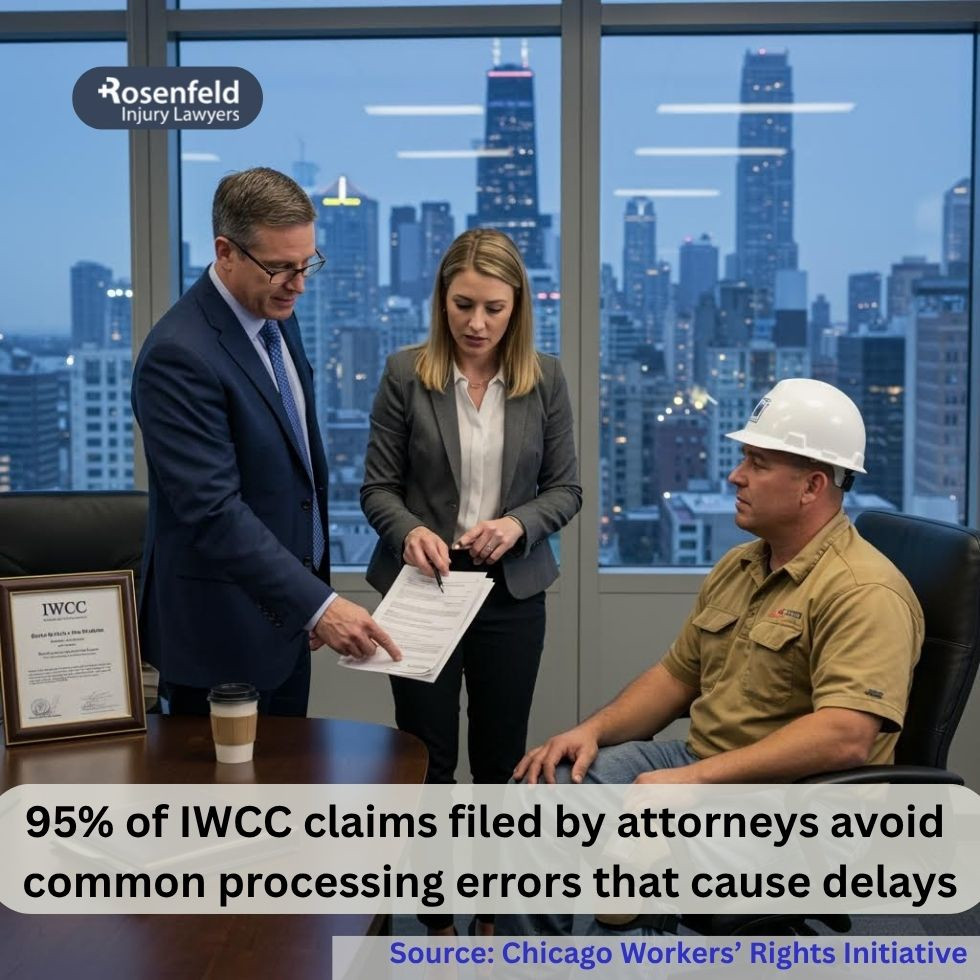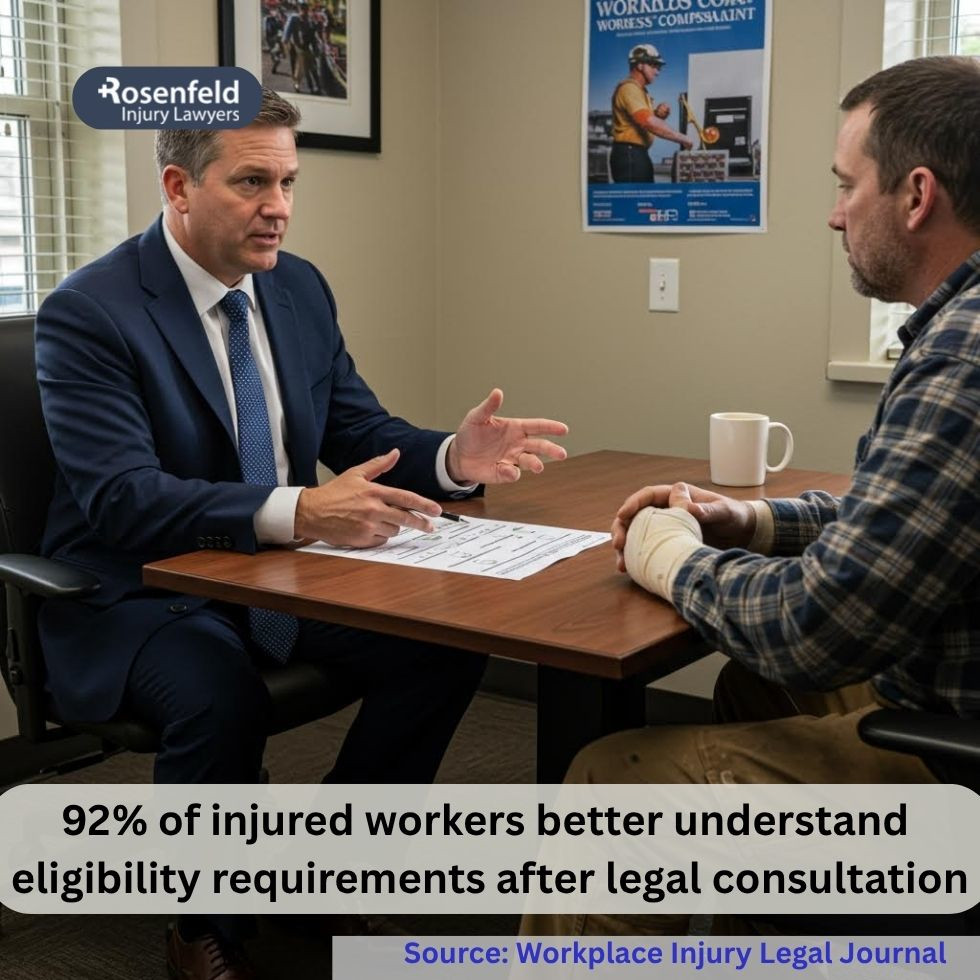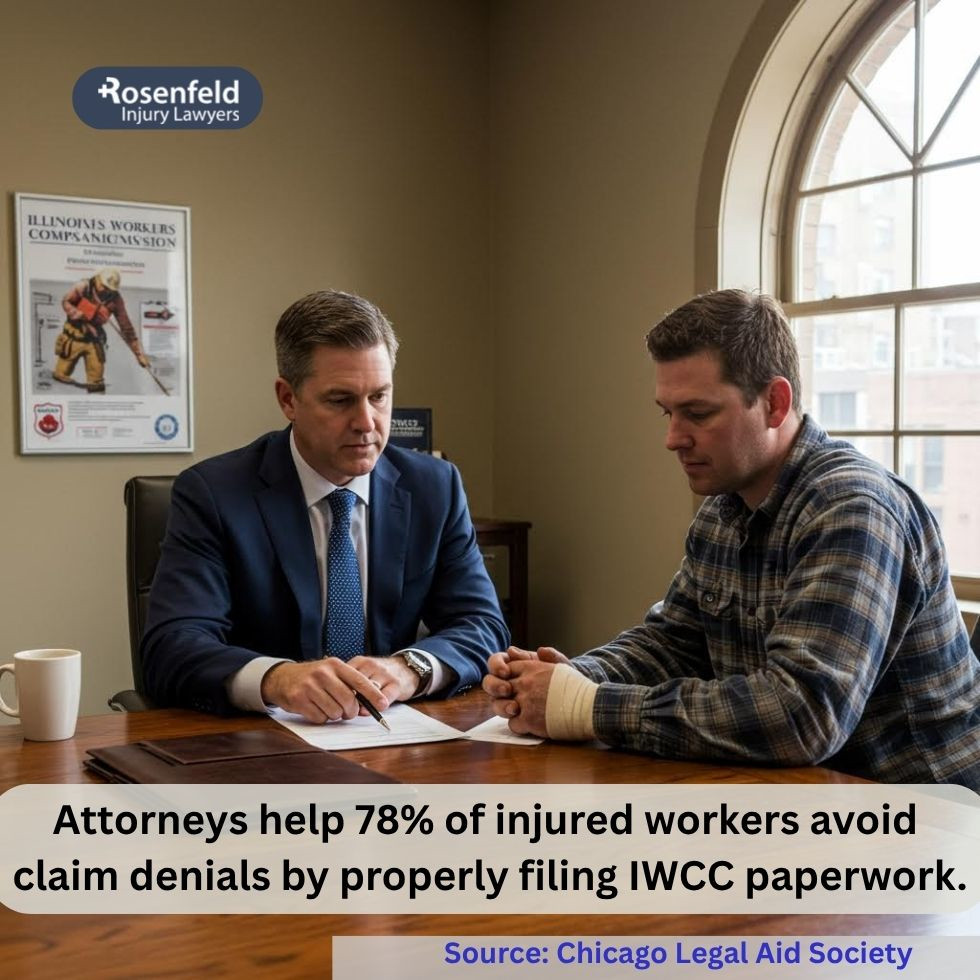- 24/7 Free Consultation: (888) 424-5757 Tap Here To Call Us
How to File a Workers’ Comp Claim in Illinois
Whether you suffered a sudden accident or developed an occupational disease over time, knowing how to file a workers’ comp claim correctly is key to protecting your health and financial future.
Filing a workers’ compensation claim in Illinois can feel overwhelming, especially when you’re dealing with pain, stress, and medical bills after a work-related injury. Understanding your rights under the Illinois Workers’ Compensation Act is the first step toward securing benefits like medical treatment, lost wages, and disability payments.
What is Workers’ Compensation?
Workers’ compensation is a no-fault insurance system designed to provide financial and medical benefits to employees who suffer job-related injuries or illnesses. It ensures that injured workers receive necessary medical care and wage replacement without needing to prove their employer was at fault. In return, workers generally give up the right to sue their employer for negligence related to the injury.
Who is Covered by Workers’ Compensation in Illinois?
Most employees in Illinois are covered by the state’s workers’ compensation system, including full-time, part-time, and seasonal workers. Coverage applies regardless of immigration status. However, some exceptions exist, such as independent contractors, certain agricultural laborers, and federal employees, who may fall under different systems. Employers are required to carry workers’ compensation insurance or obtain approval to self-insure.
What Types of Injuries and Illnesses are Covered?
Workers’ compensation in Illinois covers injuries and illnesses that arise out of and during employment. This includes sudden accidents (like slipping on a wet floor), repetitive strain injuries (such as carpal tunnel syndrome), and occupational diseases caused by workplace exposure (like hearing loss or chemical-related illness). Coverage also extends to aggravations of preexisting conditions if related to work duties.

Workers’ Comp Benefits Available in Illinois
In Illinois, injured employees may be entitled to several types of benefits. These include medical benefits for necessary treatment, temporary total disability (TTD) payments while unable to work, permanent partial disability (PPD) for lasting impairment, and permanent total disability (PTD) if the worker can’t return to any gainful employment. Vocational rehabilitation may be available for job retraining, and death benefits are provided to eligible family members if a work-related injury results in death.
Immediate Steps to Take After a Work Injury
After a job-related injury, it’s essential to act quickly to protect your health and your rights. Taking the proper steps early can help support your claim and improve your chances of receiving full benefits under the state’s workers’ compensation laws (820 ILCS 305).
Seek Medical Attention Immediately
Your health should come first. Visit a doctor or emergency room right away, even if the injury seems minor. Prompt medical treatment not only protects your well-being but also creates vital documentation. This medical report serves as critical evidence when filing your workers’ compensation claim and can help prevent the insurance company from disputing your injury.
Report the Injury to Your Employer
Illinois law requires injured workers to report their injuries to their employer within 45 days. Provide written notice as soon as possible, describing the injury and how it occurred. Include details like the date, time, and location of the incident. Failing to notify your employer within the allowed timeframe may result in your workers’ compensation benefits being denied.
Gather Information and Evidence
If you’re able, collect names and contact details of any witnesses to the accident. Take photos of the accident scene, any equipment involved, and visible injuries. Keep a record of all doctor visits, treatments, and medical expenses. This supporting documentation will be necessary if your workers’ compensation claim is questioned or denied.

Filing Your Workers’ Compensation Claim
To officially begin a workers’ compensation case in Illinois, injured workers must file with the Illinois Workers’ Compensation Commission (IWCC). This step is separate from notifying your employer and is critical for protecting your right to benefits if a dispute arises.
Completing the Application for Adjustment of Claim Form
The workers’ comp claim form initiates your formal claim with the IWCC. It’s available through the IWCC website or in person at any office. You’ll need to fill it out completely and accurately to ensure your case moves forward correctly. The application doesn’t cost anything to file.
Key Information Required on the Form
You’ll be asked to provide your full name, address, contact information, employer’s details, a description of your job, the date and nature of the injury, and the type of benefits you’re seeking. Be clear and truthful, as this form becomes part of your official case file with the IWCC.
Filing the Application with the Illinois Workers’ Compensation Commission (IWCC)
Once completed, you can file the form through the IWCC’s electronic CompFile system, by mail, or in person. There is no fee to submit your claim. After you file, the Commission will assign a case number and schedule your case on a hearing docket.
Understanding the Statute of Limitations for Filing
You must file your workers’ compensation claim within 3 years of the injury date or within 2 years of the last compensation payment—whichever is later. Missing this deadline may permanently bar you from receiving benefits, so it’s important not to delay.
What Happens After You File Your Claim?
After filing your workers’ compensation claim with the IWCC, your employer and its insurance provider will launch an investigation. They’ll review the employee report, medical records, and any witness statements to determine whether the injury is covered.
The insurer may accept the claim and begin paying benefits, or deny it. A decision is typically made within a few weeks, though delays can happen. If there are questions about your condition, the insurer may require you to attend an independent medical examination (IME) with a doctor of their choosing. You’re generally required to comply.
If your claim is accepted, you might negotiate a lump sum settlement for future benefits. If it’s denied or a fair settlement can’t be reached, your case may proceed to a hearing before an arbitrator. This hearing is like a trial where both sides present evidence and the arbitrator issues a binding decision.

Dealing with a Denied Claim
Workers’ compensation claims are sometimes denied for reasons such as missed reporting deadlines, insufficient medical documentation, disputes over whether the injury is work-related, or allegations of a pre-existing condition. If your claim is denied, you still have options.
You can appeal the decision by filing a Petition for Review with the IWCC. This must be done within 30 days of the arbitrator’s decision. The appeal process involves presenting your case to a panel of commissioners who will review the evidence and issue a ruling.
Because appeals involve legal arguments, procedural rules, and extensive documentation, working with an experienced attorney can significantly increase your chances of success. A lawyer can gather evidence, question witnesses, and advocate on your behalf to help reverse the denial and pursue the full benefits you’re entitled to under Illinois law.
Maximizing Your Workers’ Compensation Benefits
To get the full benefits you’re entitled to, keep detailed records of every medical appointment, bill, prescription, and out-of-pocket expense related to your injury. Consistently follow your doctor’s treatment plan—missing appointments or ignoring medical advice can harm your claim.
Under Illinois law, you can choose your treating doctor, but you’re generally limited to two choices unless your employer participates in a Preferred Provider Program (PPP). Be informed before switching physicians.
If you’re required to attend an Independent Medical Examination (IME), understand that it’s arranged by the insurance company. Be honest but cautious—what you say can impact your case. Know your rights and consider speaking with an attorney before the IME to protect your claim.
How a Chicago Lawyer Can Help With Your Workers’ Compensation Claims Process
A Chicago workers’ compensation lawyer can help take the pressure off an already difficult situation. From ensuring all paperwork is correctly filed to investigating your injury and gathering supporting evidence, an attorney can guide you through each stage of the claim.
They’ll handle communications and negotiations with the insurance company to protect your rights and push for the maximum benefits available. If your claim is denied or undervalued, legal representation becomes even more critical—your lawyer can represent you during appeals or at a hearing before the IWCC.
Contact Our Chicago Workers’ Compensation Attorneys Today

If you’ve suffered a workplace injury in Illinois, the workers’ compensation attorneys at Rosenfeld Injury Lawyers are ready to help. We offer free consultations and only get paid if you recover compensation.
Contact our Chicago personal injury office today at (888) 424–5757 or fill out our contact form to discuss your case. Let us fight to se
All content undergoes thorough legal review by experienced attorneys, including Jonathan Rosenfeld. With 25 years of experience in personal injury law and over 100 years of combined legal expertise within our team, we ensure that every article is legally accurate, compliant, and reflects current legal standards.







